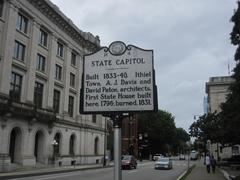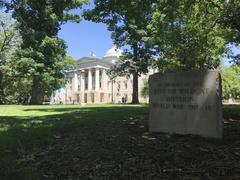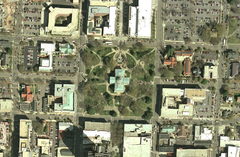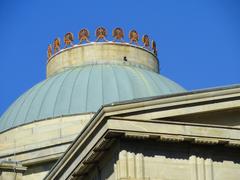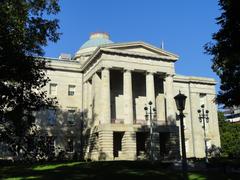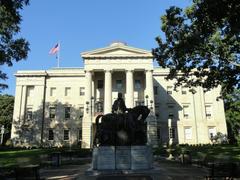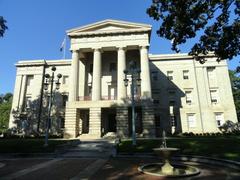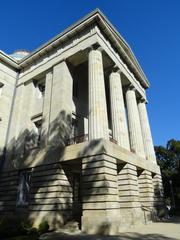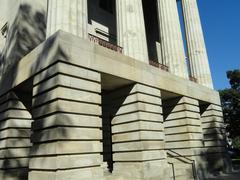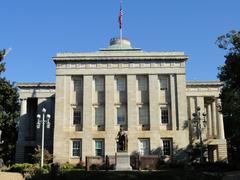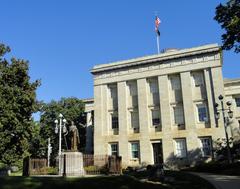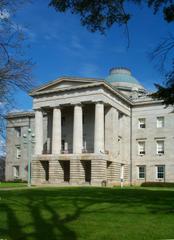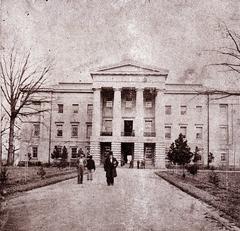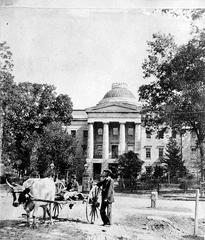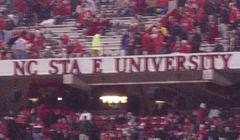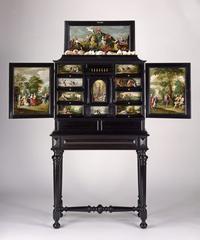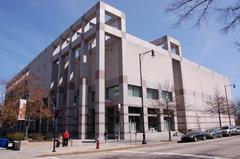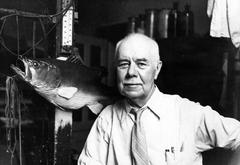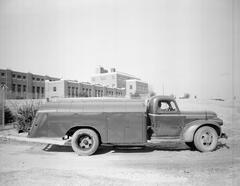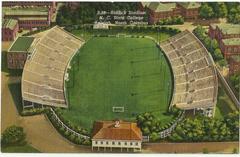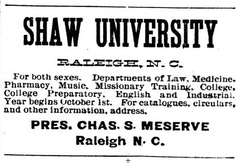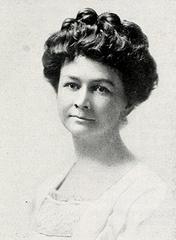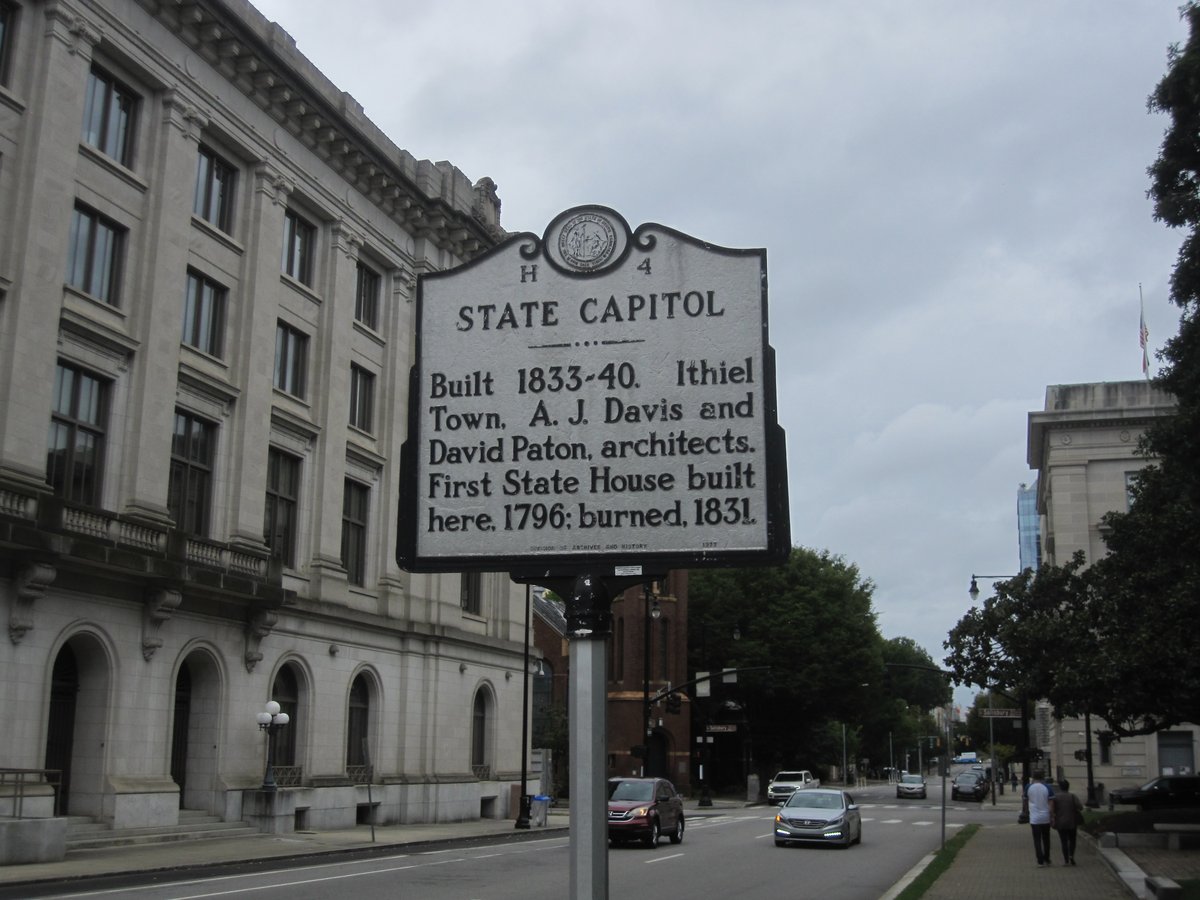
North Carolina State Capitol Visiting Guide: Raleigh Historical Site Tickets and Hours
Date: 14/06/2025
Introduction
The North Carolina State Capitol in Raleigh is a cornerstone of the state’s history, an architectural marvel, and a living symbol of democracy. Completed in 1840 and recognized as a National Historic Landmark, the Capitol embodies the ideals of the 19th century and continues to anchor Raleigh’s civic and cultural identity. This comprehensive guide provides essential information about the Capitol’s historical significance, architectural highlights, visiting hours, ticketing, tour options, and practical travel tips for an enriching visit.
For the latest updates and official resources, refer to NC Historic Sites, Raleigh Pulse, and Triangle on the Cheap.
Table of Contents
- Introduction
- Historical Background: Foundations and Rebuilding
- Greek Revival Architecture and Artistic Heritage
- Political and Civic Importance
- Monuments and Capitol Grounds
- Social Change and Civic Engagement
- Preservation and Modern Use
- Visitor Information: Hours, Tickets, and Accessibility
- Guided and Self-Guided Tours
- Parking, Directions, and Downtown Tips
- Events and Seasonal Activities
- Frequently Asked Questions (FAQ)
- Conclusion and Call to Action
- References
Historical Background: Foundations and Rebuilding
The Capitol’s story began with Raleigh’s founding in 1792. Seeking a secure and central seat for government, leaders relocated the capital from New Bern to a site purchased from Isaac Hunter—a move that would shape the city’s destiny (Raleigh Pulse). The original statehouse was completed in 1796 but was tragically destroyed by fire in 1831, prompting the construction of the present Capitol.
The new building, designed in the Greek Revival style, was erected on the original Union Square site. This decision reaffirmed Raleigh’s political prominence and set the stage for nearly two centuries of governance and civic activity (City-Data).
Greek Revival Architecture and Artistic Heritage
The North Carolina State Capitol is among the nation’s best-preserved examples of Greek Revival architecture (NPS.gov). Designed by Ithiel Town, Alexander Jackson Davis, William Nichols Sr. and Jr., and David Paton, the Capitol’s cross-shaped plan, Doric columns, and symmetrical facades were inspired by ancient Greek temples, symbolizing democratic ideals and civic virtue (Wikipedia).
Key Features:
- Doric Columns: Surround the porticoes, evoking classical grandeur.
- Central Dome: Crowned by a statue of Liberty, epitomizing the state’s commitment to freedom.
- Rotunda: Frescoed ceiling with images of North Carolinians and allegorical virtues.
- Interior Artwork: Includes a replica of Canova’s George Washington statue, busts, and historical paintings.
The building’s careful preservation ensures that visitors experience its 19th-century ambiance, especially in the restored House and Senate chambers (FieldTripDirectory.com).
Political and Civic Importance
From 1840 until 1888, the Capitol housed all three branches of North Carolina’s government. Today, it remains the seat of the Governor’s office and a symbol of the state’s legislative history (This is Raleigh). The Capitol’s design and use reflect its foundational role in shaping state policy and governance.
Monuments and Capitol Grounds
Union Square, the landscaped public space surrounding the Capitol, features statues and memorials that chronicle the state’s layered history (Wikipedia). Notable monuments include:
- George Washington Statue: Commemorates the nation’s first president.
- Presidential Monuments: Honor North Carolina-born presidents James K. Polk, Andrew Jackson, and Andrew Johnson.
- Military Memorials: Tribute to North Carolinians who served in various wars.
Recent changes, such as the removal of Confederate monuments, reflect ongoing dialogue about public memory and inclusivity (Wikipedia).
Social Change and Civic Engagement
The Capitol has been at the center of social and political movements, from civil rights rallies to educational advocacy (NC Historic Sites). Notable events, such as the Hyde County Civil Rights March, highlight the Capitol’s enduring significance as a space for public discourse and civic action.
Preservation and Modern Use
Preservation is a top priority, with significant restoration projects like the $10 million roof repair in 2023 ensuring the building’s structural integrity (Raleigh Pulse). The Capitol remains open and accessible, serving as both a functioning government office and a public museum (Wikipedia).
Visitor Information: Hours, Tickets, and Accessibility
- Address: 1 E Edenton St, Raleigh, NC 27601
- Phone: (919) 733-4994
- Hours: Monday–Friday, 9:00 a.m.–5:00 p.m.; Saturday, 10:00 a.m.–5:00 p.m.; Closed Sundays and major holidays (NC Historic Sites)
- Admission: Free; no tickets required. Donations are welcome (Visit Raleigh)
- Accessibility: Fully accessible with ramps, elevators, and accessible restrooms (Visit Raleigh: Accessibility)
Guided and Self-Guided Tours
- Self-Guided Tours: Explore at your own pace with informative displays throughout the building (Triangle on the Cheap).
- Guided Tours: Free public tours every Saturday at 11:00 a.m. and 2:00 p.m.; no reservations required. Group tours and field trips can be scheduled in advance (CAVS Registration).
Tour Highlights: The rotunda, legislative chambers, historic library, and the Governor’s office provide a window into North Carolina’s political legacy (WhichMuseum).
Parking, Directions, and Downtown Tips
- Metered Street Parking: Available around Union Square.
- Public Parking Garages: Multiple decks nearby; see Downtown Raleigh Parking.
- State-Operated Visitor Lots: Lot 18, Deck 75, Deck 77, and Visitor Lot 4 (NC DOA State Parking).
- Nearby Attractions: The North Carolina Museum of History and Museum of Natural Sciences are within walking distance (The Tourist Checklist).
Events and Seasonal Activities
The Capitol hosts events year-round, including:
- Holiday Open House and Tree Lighting: December tradition (Thriving in Raleigh).
- Independence Day at Union Square: July celebration.
- Educational Programs: For schools and families, featuring interactive history experiences (Triangle on the Cheap).
Event schedules and special hours are available on the official website.
Frequently Asked Questions (FAQ)
Q: What are the Capitol’s visiting hours?
A: Monday–Friday, 9:00 a.m.–5:00 p.m.; Saturday, 10:00 a.m.–5:00 p.m.; closed Sundays and major holidays.
Q: Is there a fee or ticket required?
A: Admission is free; no tickets are required.
Q: Are guided tours available?
A: Yes, free public tours on Saturdays at 11:00 a.m. and 2:00 p.m. Group tours must be scheduled in advance.
Q: Is the building accessible?
A: Yes, ramps, elevators, and accessible restrooms are available.
Q: Can I bring pets?
A: Only service animals are permitted inside.
Q: Is photography allowed?
A: Yes, but flash and tripods may be restricted in some areas.
Q: Where can I park?
A: Use metered street parking, nearby garages, or state-operated lots (NC DOA State Parking).
Conclusion and Call to Action
The North Carolina State Capitol is a compelling destination for history lovers, architecture enthusiasts, and visitors exploring Raleigh’s vibrant downtown. With free admission, accessible facilities, and engaging tours, the Capitol invites you to delve into North Carolina’s past and present. Plan your visit today, check the official website for updates, and enhance your experience with the Audiala app’s exclusive audio tours.
Stay connected by following us on social media for news about special events, educational programs, and local cultural highlights.
References and Further Reading
- North Carolina State Capitol: Visiting Hours, Tickets, and Raleigh Historical Sites Guide, 2024
- Visiting the North Carolina State Capitol: Hours, Tickets, and Historical Insights, 2024
- North Carolina State Capitol Visiting Hours and Tour Guide, 2024
- Visitor Tips and Practical Information, 2024
- North Carolina State Capitol, Wikipedia, 2024
- North Carolina State Capitol Pride of the State: Teaching with Historic Places, National Park Service, 2024
- Raleigh Pulse, 2024
